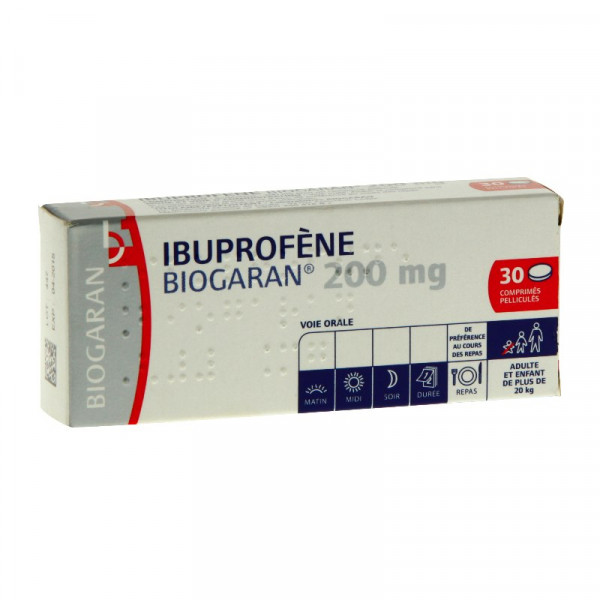Description
This medication contains a nonsteroidal anti-inflammatory drug: ibuprofen. It is indicated, in adults and children over 20 kg (approximately 6 years), for the short-term treatment of fever and / or pain such as headache, flu-like symptoms, dental pain, aches and painful periods.
Using advice
In children, the usual dosage is 20 to 30 mg / kg / day in 3 doses per day (without exceeding 30 mg / kg / day).
In children from 20 to 30 kg (approximately 6 to 11 years old): 1 tablet (200 mg), to be renewed if necessary after 6 hours. In all cases, do not exceed 3 tablets per day (600 mg).
In adults and children over 30 kg (approximately 11-12 years): 1 to 2 tablets (200 mg), to be renewed if necessary after 6 hours. In all cases, do not exceed 6 tablets per day (1200 mg).
As the elderly are at increased risk of side effects, use the lowest possible dose for the shortest time needed to relieve symptoms.
Do not exceed the recommended doses or the duration of treatment (3 days in case of fever, 5 days in case of pain).
The maximum dosage is 6 tablets per day (1200 mg).
Oral route. Swallow the tablet, without chewing it, with a large glass of water, preferably during meals.
Systematic intake helps prevent fever or pain peaks. They should be spaced at least 6 hours.
Composition
The active substance is:
Ibuprofen................................................. .................................................. .................... 200.00 mg
For a film-coated tablet.
The other ingredients are:
Pregelatinized corn starch, sodium carboxymethyl starch, povidone, colloidal anhydrous silica, stearic acid, SEPIFILM 002 *, SEPISPERSE K 7001 **.
* Composition of SEPIFILM 002: hypromellose, polyoxyl ‑ 8 stearate, hydroxypropylcellulose, denatured ethanol.
** Composition of SEPISPERSE K 7001: hypromellose, polyoxyl ‑ 8 stearate, hydroxypropylcellulose, denatured ethanol, titanium dioxide.
Precautions for use
At high doses, greater than 1200 mg / day, this drug has anti-inflammatory properties and can cause sometimes serious drawbacks which are those observed with non-steroidal anti-inflammatory drugs.
Anti-inflammatory / analgesic medicines like ibuprofen may be associated with a slightly increased risk of heart attack or stroke, especially when used in high doses. Do not exceed the recommended dose or duration of treatment.
Talk to your doctor or pharmacist about your treatment before taking IBUPROFENE BIOGARAN if you:
Have heart problems including heart failure, angina (chest pain) or if you have had a heart attack, bypass surgery, peripheral arterial disease (poor circulation in the legs or feet due to narrowed arteries or blocked) or any kind of stroke (including “mini stroke” or transient ischemic attacks (TIA));
Have high blood pressure, diabetes, high cholesterol, a family history of heart disease or stroke, or if you are a smoker;
Pregnancy and breast feeding
If you are pregnant or breast-feeding, think you may be pregnant or are planning to have a baby, ask your doctor or pharmacist for advice before taking this medicine.
Pregnancy
During the first trimester of pregnancy (12 weeks of amenorrhea, i.e. 12 weeks after the 1st day of your last period), your doctor may prescribe this medicine, if necessary.
From 2.5 to 5 months of pregnancy (12 to 24 weeks of amenorrhea), this medication should only be used on the advice of your doctor and in short administration. Long-term use of this medication is strongly discouraged.
Beyond 5 months of pregnancy (beyond 24 weeks of amenorrhea), you should under NO circumstances take this medication, because its effects on your child may have serious consequences, particularly on a cardiopulmonary level and kidney, even with just one take.
If you have taken this medicine while you were more than five months pregnant, please talk to your obstetrician-gynecologist so that you can be offered appropriate monitoring.
Feeding with milk
This medicine passes into breast milk. As a precaution, it should be avoided during breastfeeding.




